
Sinusitis is a condition that affects millions of people every year. The sinuses’ inflammation and swelling can cause various symptoms, including pain, pressure, headaches, and difficulty breathing. If you’re suffering from sinusitis, you might wonder if there’s anything you can do to find relief. While there’s no cure for the condition, treatments are available that can help ease your symptoms. One such treatment is an iodine sinus rinse.
How Does an Iodine Sinus Rinse Work?
An iodine sinus rinse is a type of saline solution that contains iodine. Saline solutions are often used to rinse the nose and sinuses because they’re gentle and non-irritating. Adding iodine to a saline solution helps kill bacteria and other organisms that can cause infection. Iodine sinus rinses are available without a prescription and can be purchased at most pharmacies or online.
Using an iodine sinus rinse is simple. First, you’ll need to mix the solution according to the manufacturer’s instructions. Next, tilt your head back and pour the solution into one nostril. Allow the solution to drain out through the other nostril. Repeat this process with the other nostril. Finally, blow your nose gently to remove any remaining solution.

Ideally, you should use an iodine sinus rinse once or twice a day to help relieve your symptoms and prevent bacterial growth. However, starting with less frequent rinses and increasing as tolerated is essential. Some people find that using an iodine sinus rinse more than once or twice daily can irritate their nose and throat. If this occurs, reduce the frequency of your rinses or try using a different type of saline solution.

Are There Any risks Associated with Using an Iodine Sinus Rinse?
When used as directed, iodine sinus rinses are safe for most people. However, some risks are associated with using any type of iodine-containing product. These risks include allergic reactions and thyroid problems. Talk to your doctor if you have any concerns about using an iodine sinus rinse.

People with known allergies to seafood or who have had previous reactions to the iodinated contrast dye used for medical procedures should avoid using iodine products. In addition, pregnant women and young children should only use products containing iodine under the supervision of a healthcare provider due to the risk of thyroid problems.

Betadine sinus rinse side effects
If you suffer from sinus infections, you may have been told by your doctor to try using a betadine sinus rinse. This type of rinse is a mild antiseptic that can help to kill bacteria and viruses in the sinuses, which can help to clear up an infection.

However, there are some potential side effects that you should be aware of before using this product.

Potential Side Effects of Betadine Sinus Rinse
One of the most common side effects of using betadine sinus rinse is nose and throat irritation. This is typically caused by the alcohol content in the rinse, which can dry out these areas. You may also experience a burning sensation when using the rinse. If this occurs, try diluting the rinse with more water or using it less often. Other potential side effects include staining of the teeth or tongue and nausea or vomiting.

If you experience severe side effects after using betadine sinus rinse, stop using the product immediately and call your doctor. Be sure to tell your doctor if you are pregnant or breastfeeding before using this product, as it is not known whether it is safe for use during pregnancy or while breastfeeding. Talking to your doctor before using this product if you have any other medical conditions is essential, as it could interact with certain medications.

Conclusion
Overall, using an iodine sinus rinse can be a helpful way to clear up a sinus infection. However, there are some potential side effects that you should be aware of before using this product. If you experience severe side effects after using betadine sinus rinse, stop using the product immediately and call your doctor. Be sure to tell your doctor if you are pregnant or breastfeeding before using this product. Talking to your doctor before using this product if you have any other medical conditions is essential, as it could interact with certain medications.

Frequently Asked Questions (FAQs)
Do Iodine-based products help reduce the viral load of COVID-19?
Patients with COVID-19 may benefit from using iodine-based nasal sprays, gargles, and mouthwashes to lower viral load in the nasopharynx.
What are some things I can do at home if I have COVID-19?
Try to get some rest and drink some fluids. Rest up and drink lots of water. Symptoms including a high body temperature, nausea, and vomiting can cause you to lose a lot of fluids, making you feel even worse. Make sure you have a large bottle of water next to your bed and drink from it frequently. Other tasty options include broth soups, honey-sweetened tea, and fruit juice.
Can I use a neti pot during the COVID-19 pandemic?
The caution against nasal irrigation stemmed from the chance that the virus could linger in devices such as neti pots, potentially spreading infection. Although we know that COVID-19 seldom spreads through surfaces, there is still a slight risk.
How do you build an immunity against COVID-19?
The most effective method of acquiring protection against the novel coronavirus is vaccination. Furthermore, it is hoped that those exposed to COVID-19 will build an immunity against the virus. With immunity, your body can detect the virus for what it is and mount an effective defense against it.




